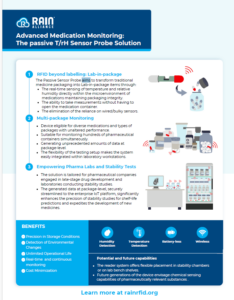In the pharmaceutical and healthcare sector, progressive evolution emerges as a vital aspect. The pharmaceutical industry needs to manage and precisely control the preservation status of drugs, not only to maximize their effectiveness but to ensure patient safety.
RADIO6ENSE (www.radio6ense.com), an innovative company in the field of monitoring solutions through IoT approaches, provides a smart solution: the Passive T (temperature) and rH (relative humidity) Sensor Probe, extending conventional RFID technology applications beyond mere labeling of pharmaceutical products. The proposed device, thanks to its sensing capabilities and miniaturized dimensions, has the potential to transform pharmaceutical containers into sophisticated Lab-in-package items, enabling accurate monitoring of microenvironment conditions of drugs at the item level.
But how does it manage to do this, and how could its application positively influence the pharmaceutical industry?
What is the Passive T/rH Sensor Probe?
The Passive T/rH Sensor Probe consists of a miniaturized wireless sensor and a data collection and analysis system. This sensor is specifically engineered to monitor the microenvironment detecting temperature and humidity parameters, within medication blisters and vials directly from within, eliminating the necessity for wired sensors or the opening of packaging. Its small size allows it to be operated in otherwise inaccessible locations, while the absence of a battery ensures an unlimited operational life, enabling continuous monitoring and eliminating concerns related to battery replacement and disposal.
Why should pharmaceutical companies use the Passive T/rH Sensor Probe?
This solution is tailored for pharmaceutical companies engaged in late-stage drug development and laboratories conducting stability studies. Adopting the Passive T/rH Sensor Probe elevates the precision of stability studies and accelerates drug development by offering detailed, item-level data without compromising packaging integrity.
Due to its characteristics, the sensor is perfectly suited to the pharmaceutical environment, ensuring:
- Secure data transmission to the laboratory network: This option ensures secure storage in the laboratory database, greatly simplifying data management and analysis. This guarantees that critical data is protected and easily accessible when needed.
- Continuous monitoring of hundreds of containers: This capability is extremely useful during extended campaigns, simplifying analysis procedures. The ability to continuously monitor numerous containers ensures accurate and reliable supervision of processes. Each sensor’s unique identification code mitigates potential data exchange issues when using multiple sensors simultaneously, maintaining accuracy and reducing reporting complexity.
- Portable reading and flexible positioning: The portable reading system allows flexible positioning in stability chambers or on laboratory benches. This offers scientists the possibility of customizing test configurations and adapting them to the specific needs of the working environment.
- User-friendly interface: The user-friendly interface not only simplifies the system operation but also allows users to easily manage the unprecedented source of data generated at the package level.
 Download the infographic, which illustrates how the Passive T and rH Sensor Probe is used in Smart Pharmaceutical Packaging.
Download the infographic, which illustrates how the Passive T and rH Sensor Probe is used in Smart Pharmaceutical Packaging.
Benefits for the Pharmaceutical Industry
There are many advantages of using the Passive T/rH Sensor Probe in the pharmaceutical industry:
- Drug Stability is guaranteed thanks to real-time and continuous monitoring which allows immediate interventions to restore the right storage conditions.
- Drug Effectiveness: Continuous T/rH monitoring ensures compliance with the correct storage conditions of drugs and therefore guarantees their effectiveness.
- Patient Safety: By ensuring the correct preservation of drugs, the Passive T/rH Sensor Probe helps to guarantee patient safety, preventing potential risks associated with inadequate storage conditions.
Case Study: Pfizer RFID-Enabled Medications
Pfizer Inc., the largest US drug research, manufacturing, and marketing company, is an important example of how the Passive T/rH Sensor Probe is making a difference. The company is the first to adopt the Sensor Probe for Accelerated Predictive Stability (APS) Studies of drugs, where it is crucial to know the exact T and RH values to build predictive models that are accurate and robust.
As a potential end-user, Pfizer played a pivotal role in shaping the solution’s specifications to align with pertinent pharmaceutical regulations and field-validated the usability of the complete platform, encompassing both the sensor and data collection and analysis system. Successful testing was conducted within the stability chambers of the analytical chemistry laboratories at Discovery Park in Sandwich, UK. Consequently, a functional MVP (Minimum Viable Product) is now accessible to any early adopters from the Pharma industry.
Revolutionizing the Pharmaceutical Industry
The Passive T/rH Sensor Probe solution enables continuous, real-time monitoring of pharmaceutical products inside packaging. Notably, it introduces a groundbreaking approach by bringing the measuring point directly into each product, made possible by its miniature size, simplified electronics, and affordable pricing. It overcomes the current limitations of wired transducers and bulky and costly data loggers that are not suitable for monitoring the microenvironment of hundreds of small bottles without any user interventions. To the best of our knowledge, no competitive technological solutions address this need of the Pharma industry. Additionally, our miniature probe can be considered as an “open platform” that can evolve to incorporate additional vital sensors for the Pharma industry, including nitrogen oxides and oxygens, formaldehyde, and UVs.
Adopting this sustainable and reliable approach paves the way for a real revolution in the pharmaceutical industry. In an era in which everything is digital and data-driven, medicine management and storage are still done in an old-fashioned way. To bring the pharmaceutical industry into the fourth industrial revolution, Radio6ense proposes this solution: transforming simple pill containers into data containers.
